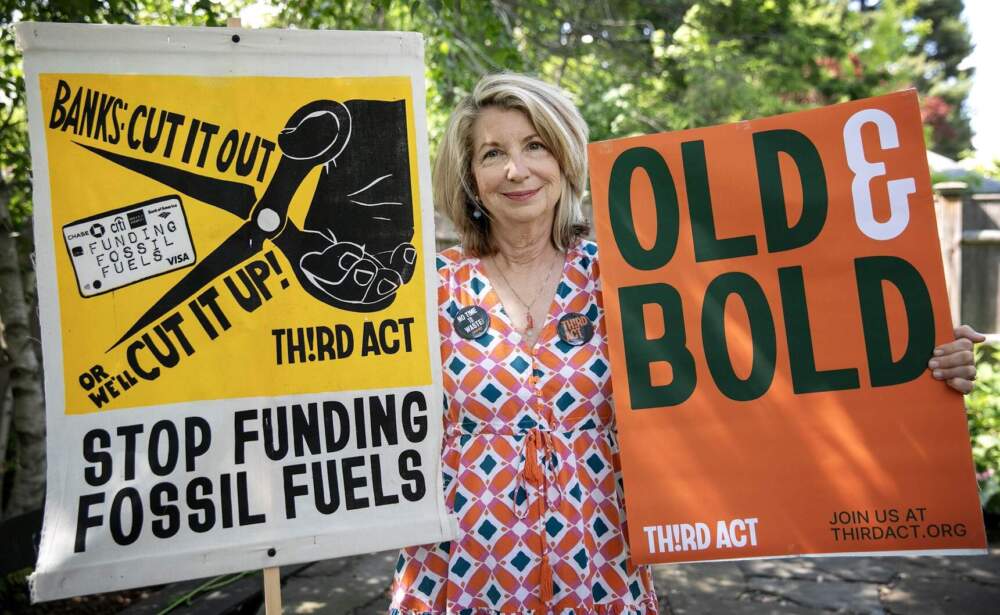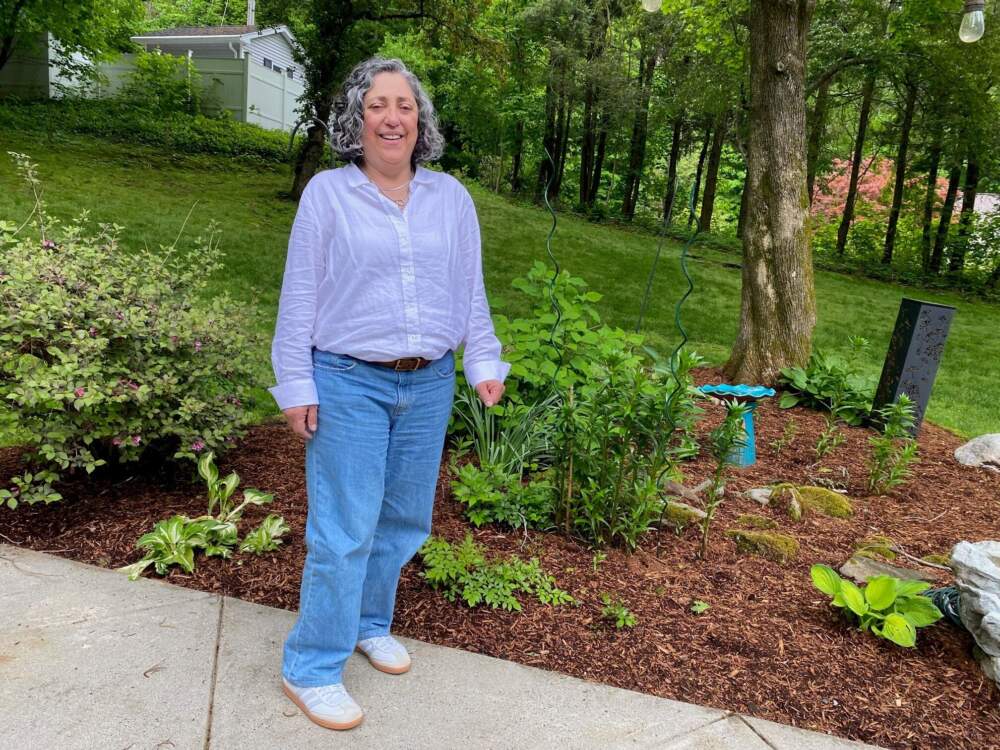Climate champion Bill McKibben recruits people over 60 to join him for an activist 'Third Act'

This story is part of WBUR's "The Third Act" series, highlighting people who worked full careers and re-invented themselves later in life, often in surprising and inspirational ways.
As the bells of the carillon chimed from the campus chapel at Vermont's Middlebury College on a recent afternoon, Bill McKibben sat in his small, book-filled office and talked about a project he hopes will save the planet. And maybe democracy.
He calls it Third Act, a three-year-old effort by the renowned climate activist to build a new political movement of retirees committed to the environment and other progressive causes. By day, McKibben, 63, teaches college classes on writing, as well as climate and social movements. When he's not in a classroom, he's urging Americans in their sixth decade and beyond to jump into the fray — to advocate for measures to address climate change, at the same time giving their lives new meaning.
While young people provide much of the leadership in the climate movement, he said, older Americans have an important role to play.
"I began to hear a few too many people my age saying, 'Oh, it's up to the next generation to solve these problems,' " McKibben said. But in his view, that's both ignoble and impractical.
"Ignoble," he said, because young people didn't cause the climate crisis. "Impractical," because for all their energy and idealism, young people lack what McKibben calls "structural power" to make the big changes needed to save the planet. So, McKibben started asking, "who does have that structural power?" The answer: people who've been around a while, like him.
"If you've reached the age when you begin to have hair coming out your ears, you probably have structural power coming out your ears too," he joked.
McKibben argues that older American men and women have a number of advantages that puts them in a strong position to advocate for change: first, they have the strength of numbers —70 million people in the United States are over age 60, and 10,000 per day are turning 65. They punch above their weight politically, he said, because they vote in high numbers, and they have about 70% of the country's financial assets.
"If you want to push around Washington or Wall Street or Beacon Hill, then having some people with hairlines like mine is a useful asset," he said, lifting his cap.
McKibben has written some 20 books, including "The End of Nature," which in 1989 sounded the alarm about climate change and is considered the first book about the crisis for a general audience. With seven Middlebury students, he founded 350.org, an international global grassroots climate campaign, which has organized demonstrations around the world. One took place in 2011, when thousands of people surrounded the White House to oppose the Keystone XL pipeline. That project would have carried oil from the tar sands of Canada down to the Gulf Coast.
"This turned into the biggest civil disobedience action about anything in this country in a very long time," McKibben said.
Police arrested hundreds of people, including McKibben, who insisted that tapping the Canadian tar sands would have meant "game over" in the fight to slow climate change. Many of those arrested were well beyond their 60s; as McKibben likes to say, they were the "fossils against fossil fuels."
"We didn't ask people as they were getting arrested, 'How old are you?' That would have been rude," he said. "But we did say, 'Who was president when you were born?' And the two biggest cohorts were from the FDR and the Truman administrations."
McKibben said one of the last people arrested at the protest was an elderly man with a sign around his neck that read, "World War II vet. Handle with care."
The Keystone XL Pipeline project grabbed the attention of three U.S. presidents: Barack Obama tried to end it; Donald Trump tried to revive it; then Joe Biden signed an executive order that stopped it, until the pipeline company ultimately abandoned the project. McKibben said the experience planted a seed that blossomed into his own Third Act: a nationwide effort to recruit and organize people over 60 to work on climate and racial justice, as well as efforts to support democracy by getting people to vote.
Today, some 100,000 Third Act volunteers are working across the country, including Meg Clough of Belmont, who worked for an investment management firm for more than 20 years, but never had time to think about retirement.
"I thought about it like I thought about death," Clough said. "Like it's actually never going to happen to me."
When she did retire at 62, she didn't know what to do next and felt lost. She joined a pickleball league, but that didn't fill the void. Then she heard about Third Act. (She actually went to high school with McKibben in Lexington and recalls him as a "smart, nerdy kid who started the debate team.") Now she works with Third Act Massachusetts, frequently traveling to swing states, like Pennsylvania and Arizona, registering people to vote. And sometimes she joins protests, as she did in Boston in 2023, when Third Act members rallied in the financial district to demand that banks divest from fossil fuel companies.

Clough said her new focus has given her a way to cope with fears about the coming election.
"I have never, ever seen so many anxious people about an election," she said. "The only way to get rid of your anxiety is to get into action. And that is what I love about Third Act." After a decades-long career in the corporate world, she said, "I have this sense of freedom — and this rebel in me that can say, 'here's how you can get involved.' "
Consuelo Sanchez, another Third Act volunteer, is also finding new purpose later in life. She lives in Wilbraham, in western Massachusetts, having grown up in Columbia before moving to America in 1981. She spent 40 years as a pediatric dentist, until an injury forced her to retire before she was ready.
"I loved every day of being a dentist," Sanchez said. What she misses most is working with children.
Like Clough, Sanchez had never really thought about what to do when she retired, so when the day suddenly arrived, she struggled. "I couldn't find my place," she said.
Now 67, Sanchez loves to garden and care for her granddaughter. She also feels she has plenty of energy to "give back." For her, connecting with Third Act meant a chance to work with fellow immigrants — particularly younger people.
"Young immigrants are a passion of mine," she said. "Many of them come from parents who had no papers. They couldn't vote. So, their kids grow up with the fear." Sanchez explained that they, too, often feel they have to live in the shadows.
Now, she spends time at community colleges and neighborhood centers in Springfield, helping young Latinos register to vote.

Back at Middlebury College, McKibben has big ambitions. He said lots of baby boomers have the time — and the passion — to take on this work. Many, he said, are fighting for policies and rights they thought were settled business for much of their lives but are now under assault. He ticks off a list of recent Supreme Court decisions that have rolled back voting rights, gun control, environmental protections and abortion rights.
"We fought for and won a lot of these things, and we've lived our lives under their protections," he said. "We're appalled to see them disappearing."
McKibben is fighting to restore those progressive causes, and hoping to reach millions more older Americans, who might be searching for their own third acts.
This segment aired on June 5, 2024.


No comments:
Post a Comment
Note: Only a member of this blog may post a comment.